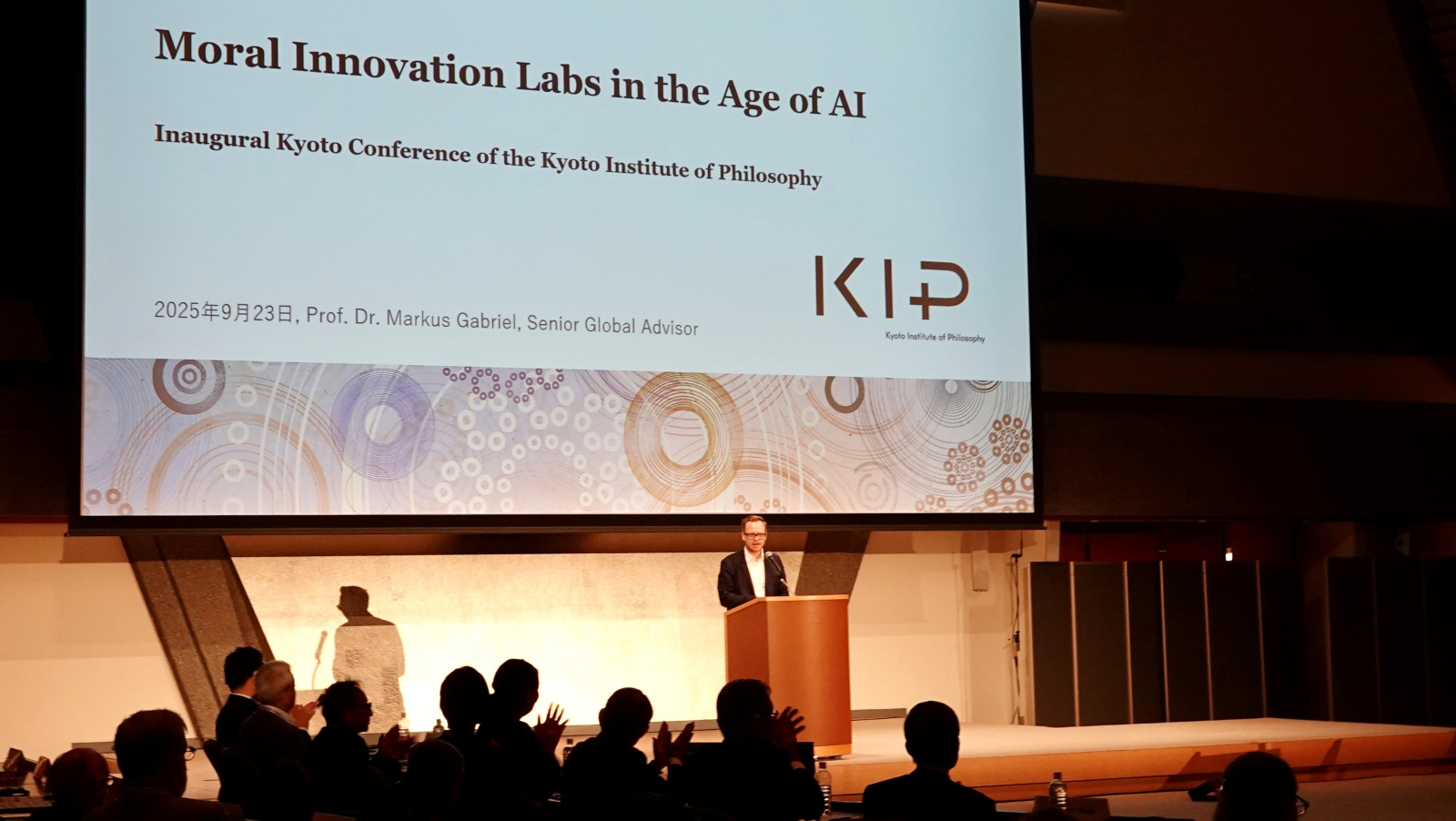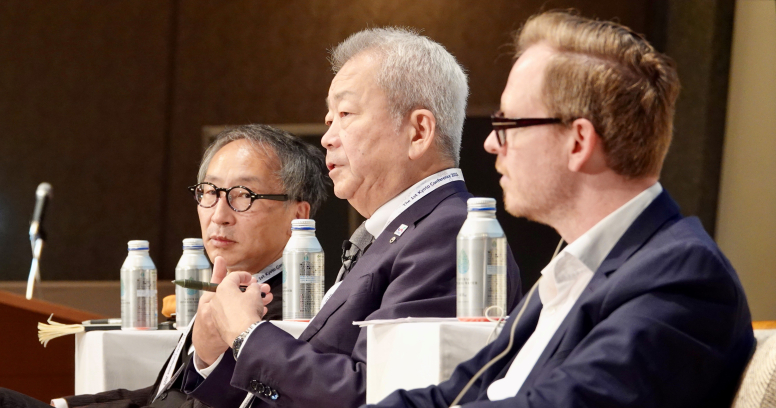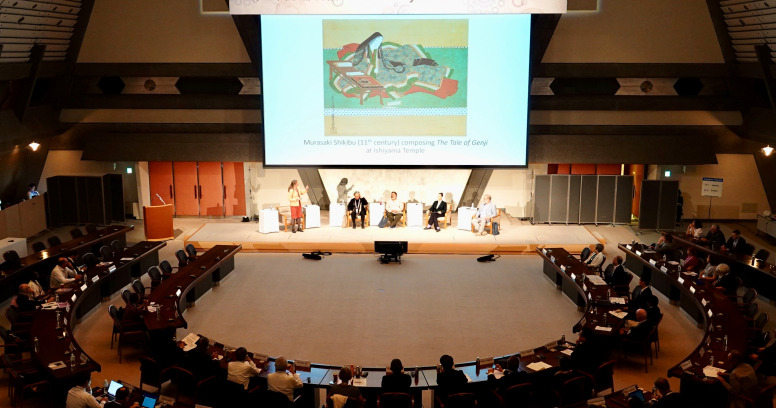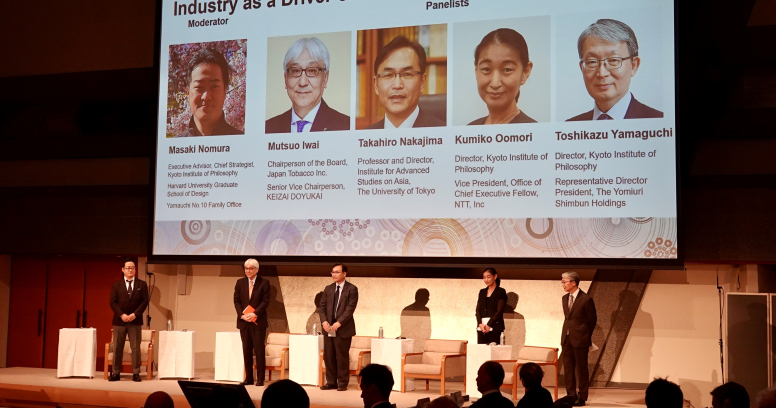Highlights from the Kyoto Conference 3: “Infusing Ethics into Technological Innovation” — Advocating International Cooperation to Overcome Global Crises: Keynote lecture by Prof. Gabriel

Following Professor Yasuo Deguchi of Kyoto University, the next speaker to take the stage was Professor Markus Gabriel of the University of Bonn, who serves as Senior Global Advisor to the Kyoto Institute of Philosophy. Amid growing environmental destruction in the wake of economic growth, the escalating U.S.-China rivalry over AI development, and the mounting crisis of democracy driven by divisions, what kind of values can illuminate our increasingly complex world? Professor Gabriel, a gifted philosopher who at age 29 became the youngest full professor in the history of the University of Bonn, took on this fundamental question.
Details
“It is a great honor for me to be able to contribute to the practical and strategic development of this new and significant institute ... I am still in the process of learning Japanese, so I will be giving today's speech in English. However, I am deeply struck by the depth and expressiveness of the Japanese language, and it is my hope that I can further explore its beauty in my forthcoming book and, in doing so, make a small contribution to this great nation.”
Professor Gabriel opened his lecture by addressing the audience in Japanese — a language he has been diligently studying. Then, switching seamlessly to fluent English, he declared:
“Today, I would like to offer a vision, a way to think about our current crises, about artificial intelligence in particular, and about the possibility of moral progress and even moral innovation in the 21st century. I’m a relentless optimist, as you will see.”
Professor Gabriel then offered his philosophical diagnosis of our times:
“We live, arguably, in an age of what I would like to call nested crises. Climate change, the crisis of liberal democracy, rising geopolitical tension and worse, the disruptive power of artificial intelligence, bioengineering and other dimensions of scientific progress — all these challenges overlap and feed into each other. They do not form, as many think, a single unified problem. So, I do not think that there is a single thing called the polycrisis, but rather a tangled network of risks and opportunities.”
He continued, “We live in conditions of profound complexity, and that complexity generates what I would like to call the paradox of innovation ... As technological progress accelerates, it creates new opportunities ... But at the same time, [it also produces] new forms of social and moral regression as unintended side effects.”
As an example of such regression, Gabriel referred to the atomic bomb — an invention born of scientific brilliance that brought about unfathomable tragedy when used in war. Turning to the realm of artificial intelligence, he warned that it is “already used to spread disinformation and undermine democracy,” and concluded that “this paradox deepens our crises.”
Faced with these “nested crises,” must humanity remain paralyzed? Describing himself as an optimist, Gabriel proposed a way forward: the creation of what he calls “moral innovation labs.” The initiative, which also served as the title of his lecture, aims to foster moral innovation through “interdisciplinary cooperation” among the humanities, natural sciences, and engineering; “trans-sectoral cooperation” across academia, government, industry, the arts, and religion; and “transcultural cooperation” that respects and integrates diverse traditions and cultures. Together, these three dimensions form the foundation of what Gabriel calls “deep innovation,” to which an ethical dimension must be added.
“[They are] places where ethics, technology, and culture work together to address the moral challenges of our time from within the sectors,” he explained. “My model is one where the humanities feed into business in such a way that we can develop concrete business cases based on the humanities ... Why moral? Why am I speaking about ‘moral’ here? Because technological revolution always forces us to rethink our values.”
Then, in a quiet yet firm tone, he emphasized: “The Kyoto Institute of Philosophy embodies this approach like no other place.”
Professor Gabriel joined the Kyoto Institute of Philosophy in August 2024. His involvement began the previous winter, when the Institute’s co-chairpersons — Professor Yasuo Deguchi and Jun Sawada, executive chairman of NTT, Inc. — visited Germany and developed an immediate rapport with him. Gabriel has long advocated for what he calls “ethical capitalism,” the idea that moral principles should be integrated into economic activity. In his book Doing Good: How Ethical Capitalism Can Save Liberal Democracy (Japanese version published by Hayakawa Publishing in 2024), he wrote that “what we need is a completely new vision of the good and bold innovation across all sectors of society.” His keynote address at the Kyoto Conference sharpened and deepened this conviction.
Can ethics and morality truly be infused into the rapidly accelerating race to develop AI? Drawing on his own experience in collaborative AI development projects, Gabriel noted, “AI systems are not neutral. They reflect the data and therefore the values of the societies that built them. Even on the mathematical level, if you look at the relevant research papers by Google, etc., about, say, the transformer technology that is currently conquering the world, you will understand that bias is constitutively built into the system.” He stressed the importance of recognizing and correcting these inherent flaws — arguing that the most effective way to do so is to imbue AI with the essence of moral and ethical awareness. “My teams are building precisely such systems ... trained on transcultural ethics and behavioral data,” he said. “These systems aim not to replace human judgment, but to enhance it, helping policymakers, companies, and communities design institutions that, by design, align with human values.”
Gabriel then returned to the concept he had introduced at the beginning of his talk — the “nested crises.”
“The Japanese word for crisis, famously, is kiki ... It combines two characters: one for danger, ki (危), and one for opportunity, ki (機) ... The nested crises of our time — climate, governance, democracy, AI and so forth — could lead to disaster. But if we build moral innovation labs powered by ethical intelligence and grounded in serious transcultural cooperation, we can turn crisis into opportunity.”
“By listening across cultures, disciplines, and technologies,” Gabriel continued, “we gain the objectivity of what historian of science Lorraine Daston calls a ‘view from everywhere.’ According to Lorraine Daston, the function of the humanities is to look at a problem from everywhere, from all cultures, and thereby identify value.”
A philosopher unafraid to confront contemporary realities, Gabriel has been described as a “rock star of philosophy.” His 18-minute keynote ended with his signature eloquence and clarity:
“We end with a call to build the institutions, the technologies, and the collaborations that allow us to co-create moral progress in the age of AI. Given that we can build such systems, it is a moral fact that we ought to do so.”
Others



